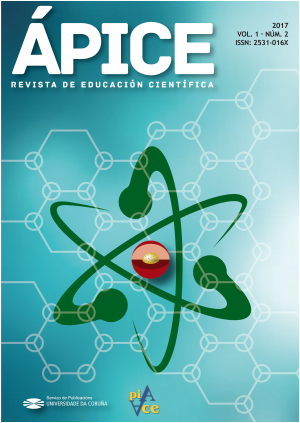From words to action: an activity on ecosystems framed in the school garden
Main Article Content
Abstract
Keywords:
Downloads
Article Details
References
Ben-Zvi Assaraf, O. y Orion, N. (2005). Development of system thinking skills in the context of earth system education. Journal of Research in Science Teaching, 42(5), 518–560.
Baena, M. (2000). Pensamiento y acción en la enseñanza de las ciencias. Enseñanza de Las Ciencias, 18(2), 217–226.
Bergada, R. (2013). Un ecosistema: el huerto escolar. Padres y maestros, 349, 41-46.
Del Carmen, L. (1999). El estudio de los ecosistemas. Alambique. Didáctica de las Ciencias Experimentales, 20, 47-54.
Desmond D., Grieshop J. y Subramaniam A. (2002) Revisiting garden-based learning in basic education. Paris: International Institute for Educational Planning (IIEP). Recuperado de: http://www.fao.org/3/a-aj462e.pdf
Eugenio M. y Aragón, L. (2016) Experiencias en torno al huerto ecológico como recurso didáctico y contexto de aprendizaje en la formación inicial de maestros/as de Infantil. Revista Eureka sobre Enseñanza y Divulgación de las Ciencias, 13 (3), 667-679. Recuperado de: http://hdl.handle.net/10498/18504
Gil Quílez, M.J. y Martínez Peña, B. (1992). Problemática de la enseñanza/aprendizaje de la ecología. Revista interuniversitaria de formación del profesorado, 14, 67-70.
Jacobson, M.J. y Wilensky, U. (2006). Complex systems in education: Scientific and educational importance and implications for the learning sciences. The Journal of the learning sciences, 15(1), 45-52.
Perelló Mulet, J. (2010). L’hort escolar: Un programa científic d’aprenentatge. Recursos i Recerca Educativa de les Illes Balears, 1. 155-176. Recuperado de: http://www.innovib.cat/numero-1/pdfs/9-pre-op.pdf
Riess, W. y Mischo, C. (2010). Promoting Systems Thinking through Biology Lessons. International Journal of Science Education, 32, 705–725.


